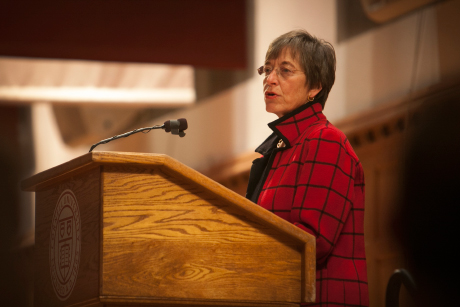VP Susan Murphy expresses gratitude in 'last lecture'
By Natalie O’Toole

With hectic schedules balancing academics, sleep and a personal life, acknowledging others may not be a routine part of everyone’s day. Yet formally expressing gratitude is paramount to a happy life, says Susan Murphy ’73, Ph.D. ’94, vice president for student and academic services, who will step down June 30.
In her “last lecture” at Cornell Dec. 3, Murphy revealed one key to her success: expressing gratitude each day for her friends, family and experiences. Discussing UC Davis professor Robert Emmons’ work, Murphy said giving thanks allows us to focus on the present, combats negative emotions, allows us to form strong social networks and helps us resist stress.
Murphy said her late husband, Gerry Thomas, Ph.D. ’78, helped convey to her the importance of gratitude. “Gerry’s ability to be thankful – for sunsets, for puppies, for little children, for life – defined his persona. After he retired, he used to greet me every night as I would come into the house by saying ‘Hi, sweetie. What was the highlight of your day today?’ That question, forcing me to focus on a positive aspect of my day and the activities for which I was grateful, allowed me to put my job here at Cornell in perspective, and then turn my focus to him,” said Murphy.
Gratefulness also helped her cope with his death in 2011, when the Cornell community and others rallied around her. Murphy said she received hundreds of notes from well-wishers after Thomas’ death and spent six months writing thank-you notes back to every person. “One day I had a friend ask me, ‘Wasn’t that activity sad or stressful?’” said Murphy. “And I remember responding instantly, ‘absolutely not.’ In fact, it was very affirming. … In expressing my thanks for their taking the time to remember me, I was developing my resilience, reducing my stress and building a path to flourish.”
Taking the time to acknowledge one’s friends and family is beneficial not only in maintaining close relationships, but in improving oneself, she said. And simply giving a holiday greeting, remembering a birthday, “a text, a Tweet [or] an Instagram,” all help cultivate friendships, she continued.
While this contact is important kindling for friendships, even more important is making the time to see one another, Murphy emphasized. For one week each year she goes on a trip with her best friends, all Pi Phi sorority sisters, and their families, which now span three generations. As an undergrad, Murphy said these were the friends she spent time with debating the existence of God for school papers, wondering when the Vietnam War would end, and mourning the victims of the Kent State shootings.
“These kinds of conversations are so fundamental to our own development and our thinking and our beliefs that any of us who share them are going to be bonded together forever,” she said.
And these friendships made as an undergraduate were just the start of the many important relationships to come thanks to Cornell. In her 37 years as an employee, Murphy said she has formed lasting friendships with former mentees, students, colleagues and others.
“I consider myself so fortunate that I have been able to work in a place filled with such special individuals, and from that my life has been enriched by these dear friends,” Murphy concluded.
“Last Lectures” is a series sponsored by Mortar Board, a national senior honor society.
Natalie O’Toole ’16 is a writer intern for the Cornell Chronicle.
Media Contact
Get Cornell news delivered right to your inbox.
Subscribe